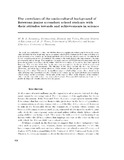The correlates of the socio-cultural background of Botswana junior secondary school students with their attitudes towards and achievements in science

View/
Date
2002Author
Kesamang, M.
Taiwo, A.A.
Publisher
Taylor & Francis, http://www.tandf.co.uk/journalsType
Published ArticleMetadata
Show full item recordAbstract
The study was undertaken to find out whether there is a significant relationship between the socio- cultural beliefs held by beginning junior secondary school (JSS) students in Botswana and their attitudes towards school science on one hand and their achievement in school science on the other hand. Seven research questions were formulated. The nature of the study dictated the employment of descriptive research (survey) design. The sample for the study consisted of 395 JSS students randomly selected from eleven junior secondary schools within 120 kilometre radius of Gaborone, the state capital of Botswana. The collection of the data for the study was accomplished by the use of three constructed and validated research instruments. The findings of the study include the fact that Setswana1 (Botswana) mythology has a telling effect, to a large extent, on the thought processes of the average Botswana JSS student. This resulted in significant negative relationships between the students’ socio- cultural background and their attitudes towards school science on one hand and their achievement in school science on the other hand. But in spite of the negative effect of the elements of the students’ culture on the ease with which they learn school science, Botswana JSS students are found to be positively disposed towards school science in general.
